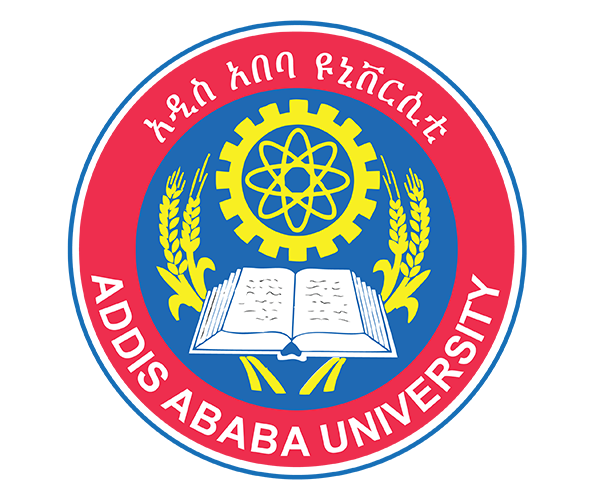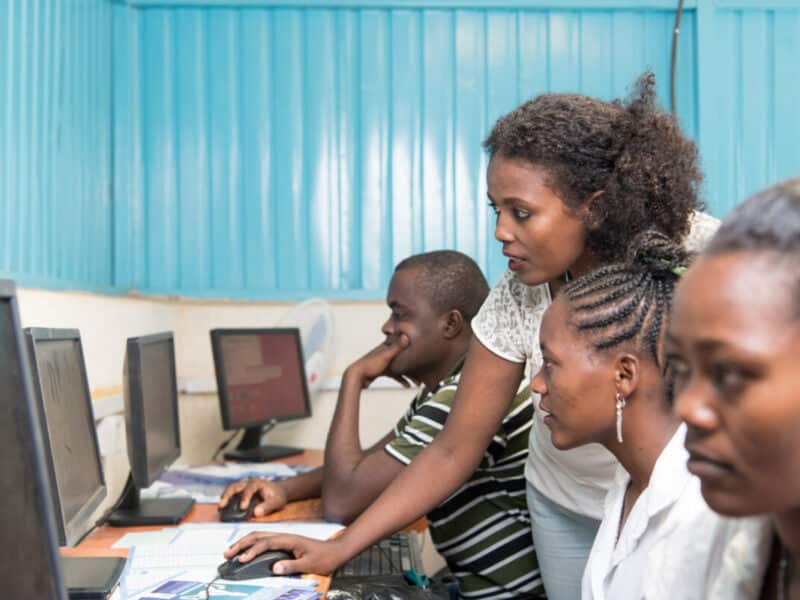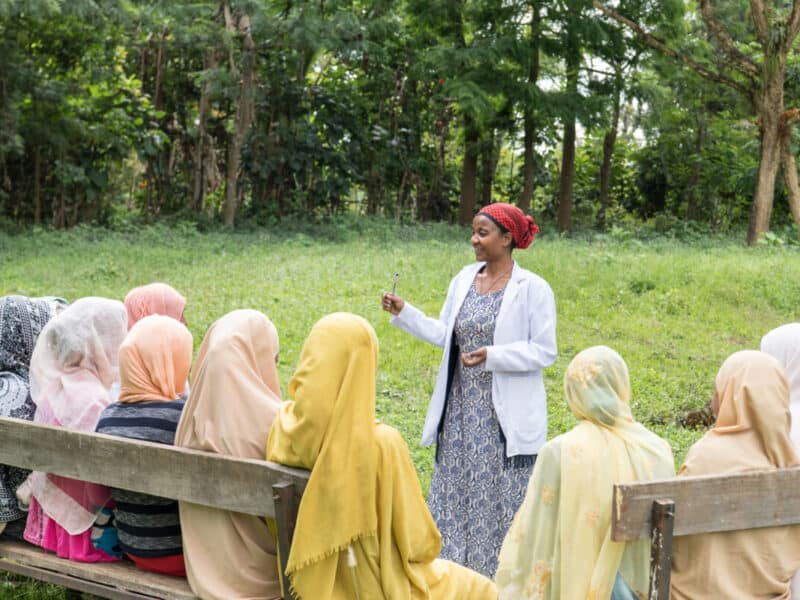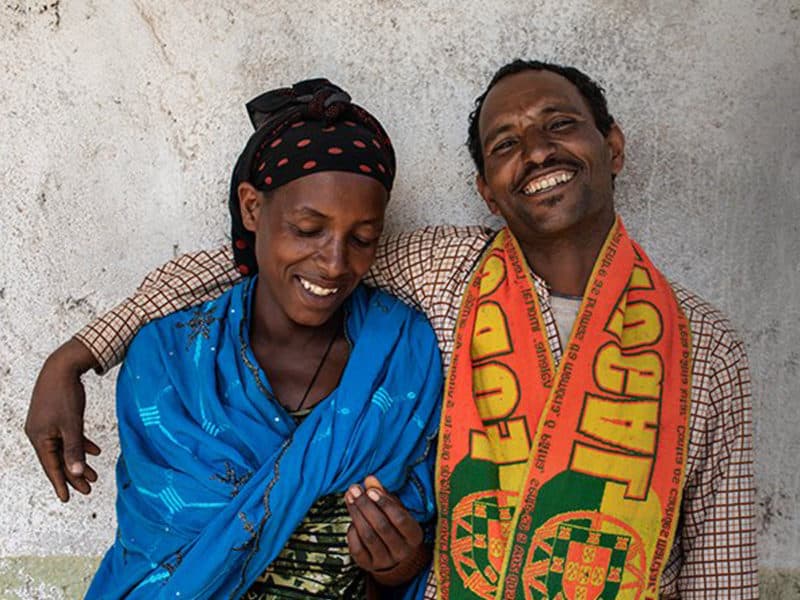An exciting new HIV communication program targeting university students was introduced to the Addis Ababa University (AAU) community today. The program uses entertainment education and a certificate training course to provide students with the skills to practice healthier behaviors in their daily lives and to promote these behaviors among their peers.
The AAU’s Modeling and Reinforcement to Combat HIV/AIDS (MARCH) Project is implementing the program. It is designed to empower students with the knowledge and skills needed to make safe, healthy, responsible, and respectful decisions about sex and relationships, to live productive and healthy lives (for those living with HIV) and to reduce stigma and discrimination against people living with HIV. The project uses the U.S. Centers for Disease Control and Prevention’s (CDC) MARCH behavioral change model to encourage positive behavior by modeling behavior change over time in an entertaining serial drama. Positive behaviors are then reinforced through reflection, discussion, and other community-level activities.
This program is funded by the President’s Emergency Plan for AIDS Relief (PEPFAR) through CDC-Ethiopia. Technical assistance is provided by the Johns Hopkins Bloomberg School of Public Health/Center for Communication Programs (CCP), National AIDS Resource Center (ARC) and CDC.
“This project is one of three MARCH projects that have been launched in Ethiopia; we are proud to be a part of such a life changing program for university students who need to own the skills that will allow them to make decisions that positively affect their health and wellbeing.,” says Dr. Endale Workalemahu, BCC Technical Officer for CDC.
The AAU MARCH Project is developing a two-year long photo comic book and a certificate course for students that will reinforce the ideas covered in the comic book. Both activities are a departure from approaches taken in other MARCH projects recently launched in Ethiopia. “We had to give the comic book a more modern and stylish look for university audiences. So we’ve used photo comics rather than cartoon comics. Also, instead of peer discussion groups, a certificate curriculum has been designed to enable students to conduct events that will promote positive and healthy behaviors among their peers using the comic book,” says Dr. Daniel Fekade, AAU MARCH Project Director.
The comic book, “Life 101, The Journey,” uses drama, humor, and heartbreak to explore the challenges facing Addis Ababa university students today, such as HIV/AIDS. It follows the story of three students and a couple at AAU as they traverse daily university and city life, and deal with issues such as transactional sex, condom use, relationships, testing for HIV, and gender equity. The reinforcing certificate training program will train students on how to use strategic communication to design, implement and monitor campus events covering these and other issues.
Trainers consist of AAU academic staff and NGO staff who will utilize experiential learning techniques to educate students about various topics such as the basics of HIV/AIDS, gender, stigma, entertainment education, and health communication “The curriculum was designed to allow students to explore their own ideas about these pivotal issues and gain important life skills such as negotiating condom use, effective communication and group facilitation. We are excited to see how their newly acquired skills will make them change agents among their peers,” says Abiy Alazar, CCP MARCH Coordinator.
Notes for Editors
Since opening in 2001, the AIDS Resource Center (ARC) has been providing an extensive range of information services on HIV and AIDS, STIs, and tuberculosis (TB). The ARC serves as a hub for a host of resources and services, such as a comprehensive multimedia library collection, high-speed Internet access for HIV and AIDS research, an HIV/AIDS website with searchable databases, and a materials clearinghouse. The center also runs the Wegen 952 national HIV and AIDS talkline and produces high-quality and culturally appropriate behavior change communication (BCC) materials on various health topics. www.etharc.org.
In 2005, the Addis Ababa University (AAU) and the Centers for Disease Control and Prevention (CDC) initiated a behavior change communication project to prevent and control HIV/AIDS among University students by using the Modeling and Reinforcement to Combat HIV/AIDS model for behavior change. The Project aims to develop positive and sustainable health behaviors among AAU students.
The President’s Emergency Plan for AIDS Relief (PEPFAR) is a five-year, $15-billion U.S. government initiative to combat the global HIV/AIDS pandemic with the goals of treating two million HIV-infected people, preventing seven million new infections, and care for 10 million HIV-infected individuals and AIDS orphans. It is the largest commitment ever made by a nation for an international health initiative dedicated to a single disease. A significant amount of these resources focus on 15 of the most afflicted countries in sub-Saharan Africa, Asia, and the Caribbean. Ethiopia is one of the 15 focus countries to receive support from PEPFAR. Since 2001, CDC-Ethiopia has been supporting the Ethiopian government to reduce the incidence of HIV/AIDS, STI and TB and mitigate their impact through prevention, care, support, treatment and capacity building activities.
With representatives in more than 30 countries, Hopkins’ CCP partners with organizations worldwide to design and implement strategic communication programs that influence political dialogue, collective action, and individual behavior change; enhance access to information and the exchange of knowledge to improve health and health care; and conduct research to guide program design, evaluate impact, and advance knowledge and practice in health communication.





